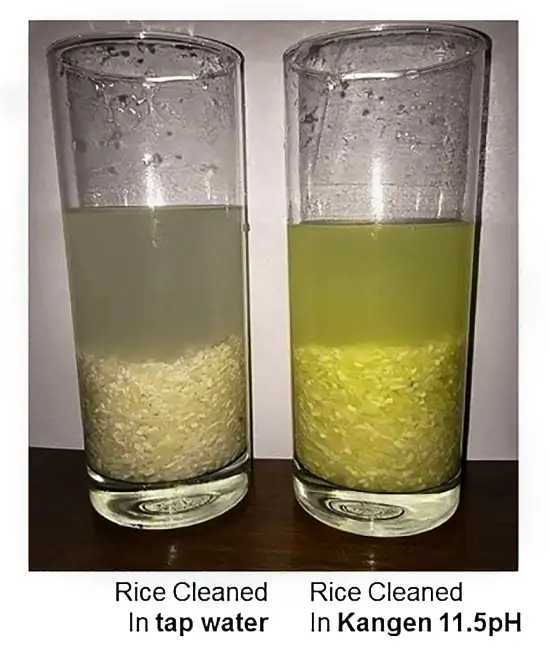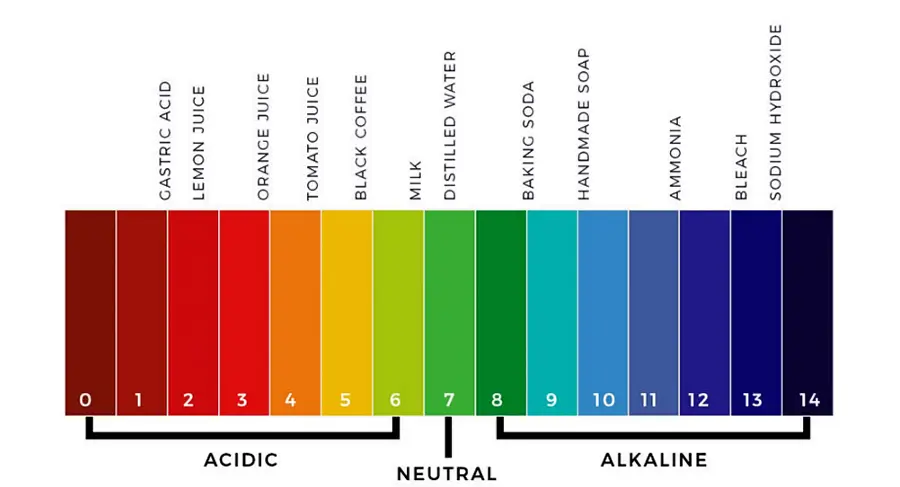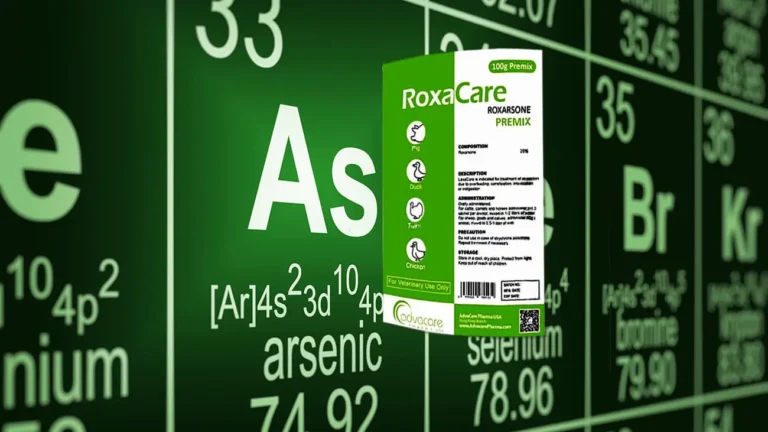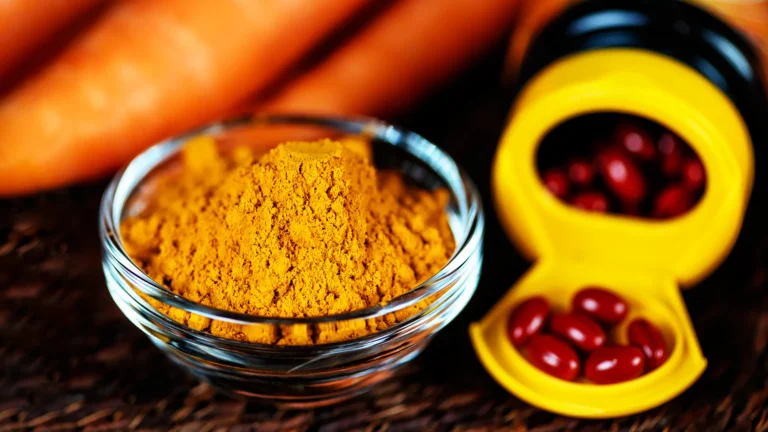Alkaline water- Health benefits and risks
There are many health talks in the health and nutrition community about the benefits of “ionized water” or “alkaline water.” What does science have to say?
Milos Pokimica
Written By: Milos Pokimica
Medically Reviewed by: Dr. Xiùying Wáng, M.D.
Updated June 9, 2023There are many health talks in the health and nutrition community about the benefits of “ionized water” or “alkaline water.”
What science has to say about it all?
It is possible that water contains dissolved ions. Meaning some metallic atoms or electrically charged molecules that can transfer electricity. Ideally, distilled pure water is nothing more than just H2O molecules, and that is it. These H2O molecules are arranged and linked together in a free and chaotic network structure with individual molecules bumping into one another all the time. Water in its liquid form is not a geometrical and arranged structure like ice. Water molecules also show a very slight affinity to dissociate (ionize) into hydrogen and hydroxide ions: H2O; H + + OH-. The level of this is minuscule because the opposite reaction is much stronger in bringing back the status quo instantly. On average only about two in one billion molecules of H2O are dissociated.
No technological process or chemical additive is capable of increasing these ion concentrations in pure water. Pure water can be regarded to be ion-free, as evidenced by the fact that it will not conduct an electric current. There is no known technological method or chemical additive that is able to increase these ion concentrations in pure water above these two in one billion minute levels. These levels are so small that for most realistic and practical purposes pure water can be considered ion-free. Distilled water has no ions, as shown by the fact that it is unable to conduct an electric current.
Acidic or alkaline “water” has nothing to do with water at all, and that is what people need to understand. All water contains both H + ions and OH- ions. If the amount of H + exceeds that of OH-, the water is acidic. If there are more OH- ions than H +, the water is alkaline. If the pH values are lower than seven water is acidic, and alkaline solutions are more than 7.
Pure distilled water, has no ions and that means that the distillation can never be alkaline or acid, nor can it be produced by electrolysis. Since alkaline liquid always has an excess of OH ions, it must also always contain another type of positive ion in addition to H + to compensate for the opposite charges. This additional positive ion is almost always a metallic ion such as magnesium, calcium, or sodium. Similarly, acidic water must always contain negative ions in addition to OH-. This means that waters whose pH differs from 7 are never pure in the chemical sense. Distilled water is pure and can never be alkaline or acidic. Groundwater containing different metal ions that it picks up such as calcium and magnesium can be made slightly alkaline by electrolysis, but that does not mean anything. As soon as “healthy alkaline” water enters the stomach and is mixed with highly acidic gastric fluid in the stomach, its alkalinity disappears.
The idea that we should consume alkaline water to neutralize the effects of acidic foods is not correct and not just that, it is a very bad idea as well. By exhaling carbon dioxide, our bodies will get rid of excess acid. It is not a big problem. However, if you really do de-acidify your stomach, it will cause the problem of successful protein degradation and will interfere with digestion. If acidity in the stomach is lowered by any means during the meal, it will mean that food will not be digested properly.
There are benefits only for people with acid reflux (Koufman et al., 2012). This study has found that alkaline water with pH 8.8 does instantly denature pepsin, rendering it permanently inactive. For patients that have reflux disease, alkaline water can help in acid-buffering capacity and may have therapeutic benefits. However, if you do not have reflux, drinking it during or after the meal will cause the lowering of the acid level in the stomach and interfere with food degradation and interfere in nutrient absorption. If you want to drink it, then do not drink alkaline water except on an empty stomach. Supporters of drinking alkaline water still believe in its many proposed health benefits, such as detoxifying properties, immune system support, colon cleansing, weight loss, cancer resistance, anti-aging properties, hydration, skin health, and the list goes on and on.
There are actually a couple of Chinese studies that discovered some of the health benefits in the form of anti-oxidative support (Zhao et al., 2005). The conclusion was that alkaline ionized water could enhance the heat tolerance of heat-exposed mice and it might be related to enhancing anti-oxidative function against the damage by free radicals. This was a surprise to me, but I do not believe that the Chinese People’s Liberation Army would do a bad science experiment. Chinese did a couple of studies.
In this study (Watanabe et al., 2018) they did find something even more interesting. The objective was to analyze the changes in blood sugar, blood pressure, and blood lipids in patients with diabetes mellitus, hyperlipidemia, and essential hypertension. After they have drunk alkaline ionized water the blood lipids and blood pressure levels dropped in some subjects even to the normal ranges. The study concluded that ionized alkaline water might be used as one of the accessory therapeutic methods for diabetes mellitus, hyperlipidemia, and essential hypertension.
What is going on? It bugged me. There are two types of alkaline water. The artificial alkaline water which is generally tapped water runs through an electrical ionizer to make the pH more alkaline and bottled spring or mineral water. Naturally-occurring mineral water contains alkalizing compounds in the form of rocks that it picks up, such as magnesium, silica, calcium, bicarbonate, and potassium. You can also purchase ionizing water machines.
Water ionizers are machines designed to work as water electrolyzes but what they do in reality is just use platinum or titanium to make water alkaline. They do not add any of the minerals found naturally in the ground. You can just ad backing soda for cheap, and you will have alkaline water, but why does it matter at all? When electrolysis or if you like the electrochemical process splits water molecules to form hydrogen and oxygen by an electric current the two types of substances will be created and none of them will be the real water. “Water” near the cathode would be alkaline and “water” near the anode would be acidic. Water ionizers work by simply siphoning off the water near the cathode that has higher pH (i.e., be more alkaline) and water near the anode would have increased levels of H+ making it acidic.
With machines like Kengen, you do not drink true alkaline water made in nature. You are actually drinking regular tap water with added hydroxide ions making it alkaline. It is not water at all. It just looks like water, but it is filled with hydroxide ions created by electrolysis. People talking about the antioxidative properties of this kind of Kengen-created hydroxide ions-filled water usually forgot or don’t even know the answer to one very important question. What happens after that hydroxide (OH–) that is antioxidant donates its electron? What happens is that it became one of the most cytotoxic oxygen radicals: the hydroxyl radical. Hydroxide is not an antioxidant, no matter what someone tells you. Hydroxide (OH–) is higher in alkaline water, but it is not a biological antioxidant. Hydroxyl radicals can occasionally also be produced as a byproduct of immune system activation. Macrophages and microglia (a type of immune cell) generate this compound to fight against some types of bacteria. The destructive action of hydroxyl radicals has been implicated in several neurological autoimmune diseases and can damage virtually all types of macromolecules. I will not personally take any antioxidant no matter how powerful it is if it has the potential to turn itself into free radicals.
The hydroxyl radical has high reactivity and a very short in vivo half-life of 10 seconds. This makes it a very toxic substance to the organism (Lipinski, 2011). The hydroxyl radical cannot be eliminated by an enzymatic reaction, as this would require its diffusion to the enzyme’s active site. As diffusion is slower than the half-life of the molecule, it will react with any oxidizable compound in its vicinity. Unlike superoxide, which can be detoxified by superoxide dismutase, the hydroxyl radical cannot be eliminated by an enzymatic reaction, and once created it will do full damage. Hydroxyl radical is the most reactive toward DNA among all known reactive oxygen species (ROS) generated in aerobic organisms by cellular metabolisms.(Chatgilialoglu et al., 2021).
Our bodies never had to deal with this molecule in the past. It is a new and non-natural antioxidant that has the potential to do a lot of damage if not eliminated from the body. And that is the real issue. Our bodies have no enzyme to eliminate them. Never drink Kangen Water Machine fake alkaline water filled with hydroxide ions created by electrolysis.
This water can be useful in other circumstances. Our fruits and vegetables are sprayed with pesticides, so strong alkaline water is excellent in minimizing and reducing pesticide residues.

there are many advantages to having an ionizer that produces alkaline and acidic water, especially if you have sodium hypochlorite in the mix.
Strong acidic water with sodium hypochlorite results in a substance called Hypochlorous acid (HOCl), which is effective in killing 99.99% of germs and bacteria, including Staphylococcus, E. coli, and Salmonella, MRSA infections, and diabetic ulcers. It is good, not just for wound healing but for all skin infections like acne for example.
There are some real benefits from real alkaline water, and that benefit is hydration. It took me a long time but eventually, I found a different line of research studies and I understood what is the science behind the positive effects of alkaline water found in those studies done in China. Water molecules stick together in clusters. In normal conditions, water molecules arrange themselves in clusters of 14 molecules. When electrolysis breaks the bonds between oxygen and hydrogen creating hydroxide (antioxidant) and hydrogen ions it also breaks down clusters to a smaller size. Also in alkaline water, these clusters can be as small as five water molecules. They make the water a better solvent and increase fluidity. The reason why boiling water has lower surface tension is that of this smaller clustering of water molecules. If water gets too much energy as heat, it loses the clustering ability completely and became a monoatomic form of water known as steam. And I think this is where some of the benefits of alkaline water exist.
In this study, they added some baking soda to the water and tested for cholesterol (Pérez-Granados et al., 2010). The result was that systolic blood pressure decreased significantly after four weeks of bicarbonate water consumption, without meaningful differentiation between weeks 4 and 8. Then significant reductions in total cholesterol by 6.3%, LDL cholesterol, the bad cholesterol by 10%. The conclusion was that:
“Sodium-bicarbonate mineral water improves lipid profile in moderately hypercholesterolemic young men and women and could, therefore, be applied in dietary interventions to reduce cardiovascular risk.”
(Pérez-Granados et al., 2010)
This water had no antioxidants in there just baking soda.
I think I found the answer in this study (Weidman et al., 2016) and it was not the alkalinity of the minerals in the water. It was viscosity. This was a randomized, double-blind study with one hundred healthy adults. After exercise-induced dehydration, participants were randomized to rehydrate with an electrolyzed, high-pH (alkaline) water or standing water. The result was that electrolyzed, high-pH water reduced blood viscosity by an average of 6.30% making it easier for the blood to flow through the bloodstream compared to 3.36% with standard purified water. What does blood viscosity mean? Viscosity is the internal friction of blood flow. The higher the viscosity, the harder the blood. For example, water has a lower viscosity than honey. Drinking alkaline water can be good only because of the lower viscosity and nothing else. For research into sports drinks and nutrition, this is a topic of great interest. For general public health as well.
Highly viscous blood will have a harder time going thru the bloodstream forcing the heart to work harder. The heart will have to have stronger and more powerful contractions to do the extra pumping and in the time that can weaken the heart muscle. Also, viscous blood will raise blood pressure, and it will be more likely for the blood to form clots inside arteries and veins. If blood is sticky due to dehydration or fat in the bloodstream or other factors, the blood flow is impaired, and intercellular communication is impaired. The stickier the blood the harder it is for the body to undergo cellular detoxification. There is so far a solid understanding and a large number of studies that have been done and showed that elevated blood thickness is associated with heart disease and conditions like lupus and diabetes. Diabetes, smoking, and chronic inflammation, also increase the viscosity of blood. Aspirin and warfarin and other blood thinners work by chemically inhibiting blood fragments known as platelets to clump and form clots. That is why an aspirin a day is usually prescribed to a patient who already had a heart attack or has some other sort of cardiovascular problem. Aspirin or warfarin does not, in reality, alter the thickness (viscosity) of blood and the heart still needs to pump harder and blood pressure is still elevated they just make it harder for blood to form clots. Fluid dynamics is a big science in space agencies and warfare and in general research of propulsion systems.
It seems, and this is just a consideration that somehow alkaline water has a lower viscosity.
It acts as a mechanism that will increase the fluidity of the blood and detoxification at the cellular level and increase the hydration of the cells and will release the pressure on the cardiovascular system. How does it do it I do not know, and I can only speculate. When insects land on the surface some of them can even walk on water due to the surface tension. When fluidity is increased, the capability for intercellular water chemical interactions increases, and the body can go into detoxification easier so inflammation will drop.
References:
- Koufman, J. A., & Johnston, N. (2012). Potential benefits of pH 8.8 alkaline drinking water as an adjunct in the treatment of reflux disease. The Annals of otology, rhinology, and laryngology, 121(7), 431–434. https://doi.org/10.1177/000348941212100702
- Zhao, Lan, et al. “Alkaline Ionized Water Enhancing Heat Tolerance and Anti-Oxidative Function of Heat-Exposed Mice.” Journal of PLA Preventive Medicine, vol. 23, no. 6, Dec. 2005, pp. 394-396.[SinoMed]
- Sun, L., Zhou, P., Hua, Q., Jin, C., Guo, C., & Song, B. (2018). Effects of blood glucose, blood lipids and blood pressure control on recovery of patients with gastric cancer complicated with metabolic syndrome after radical gastrectomy. Experimental and therapeutic medicine, 15(6), 4785–4790. https://doi.org/10.3892/etm.2018.6033
- Effects of alkaline Ca~ (2+)-water on blood pH, calcium level and immune function in rats School of Life Science, South China Normal University, Guangzhou 510631, China
- Pérez-Granados, A. M., Navas-Carretero, S., Schoppen, S., & Vaquero, M. P. (2010). Reduction in cardiovascular risk by sodium-bicarbonated mineral water in moderately hypercholesterolemic young adults. The Journal of nutritional biochemistry, 21(10), 948–953. https://doi.org/10.1016/j.jnutbio.2009.07.010
- Weidman, J. J., Holsworth, R. E., Brossman, B., Cho, D. C., St Cyr, J. A., & Fridman, G. (2016). Effect of electrolyzed high-pH alkaline water on blood viscosity in healthy adults. Journal of the International Society of Sports Nutrition, 13(1). https://doi.org/10.1186/s12970-016-0153-8
- Chatgilialoglu, C., Ferreri, C., Krokidis, M. G., Masi, A., & Terzidis, M. A. (2021). On the relevance of hydroxyl radical to purine DNA damage. Free radical research, 55(4), 384–404. https://doi.org/10.1080/10715762.2021.1876855
- Lipinski B. (2011). Hydroxyl radical and its scavengers in health and disease. Oxidative medicine and cellular longevity, 2011, 809696. https://doi.org/10.1155/2011/809696
Do you have any questions about nutrition and health?
I would love to hear from you and answer them in my next post. I appreciate your input and opinion and I look forward to hearing from you soon. I also invite you to follow us on Facebook, Instagram, and Pinterest for more diet, nutrition, and health content. You can leave a comment there and connect with other health enthusiasts, share your tips and experiences, and get support and encouragement from our team and community.
I hope that this post was informative and enjoyable for you and that you are prepared to apply the insights you learned. If you found this post helpful, please share it with your friends and family who might also benefit from it. You never know who might need some guidance and support on their health journey.
– You Might Also Like –

Learn About Nutrition
Milos Pokimica is a doctor of natural medicine, clinical nutritionist, medical health and nutrition writer, and nutritional science advisor. Author of the book series Go Vegan? Review of Science, he also operates the natural health website GoVeganWay.com
Medical Disclaimer
GoVeganWay.com brings you reviews of the latest nutrition and health-related research. The information provided represents the personal opinion of the author and is not intended nor implied to be a substitute for professional medical advice, diagnosis, or treatment. The information provided is for informational purposes only and is not intended to serve as a substitute for the consultation, diagnosis, and/or medical treatment of a qualified physician or healthcare provider.NEVER DISREGARD PROFESSIONAL MEDICAL ADVICE OR DELAY SEEKING MEDICAL TREATMENT BECAUSE OF SOMETHING YOU HAVE READ ON OR ACCESSED THROUGH GoVeganWay.com
NEVER APPLY ANY LIFESTYLE CHANGES OR ANY CHANGES AT ALL AS A CONSEQUENCE OF SOMETHING YOU HAVE READ IN GoVeganWay.com BEFORE CONSULTING LICENCED MEDICAL PRACTITIONER.
In the event of a medical emergency, call a doctor or 911 immediately. GoVeganWay.com does not recommend or endorse any specific groups, organizations, tests, physicians, products, procedures, opinions, or other information that may be mentioned inside.
Editor Picks –
Milos Pokimica is a health and nutrition writer and nutritional science advisor. Author of the book series Go Vegan? Review of Science, he also operates the natural health website GoVeganWay.com
Latest Articles –
Top Health News — ScienceDaily
- The overlooked nutrition risk of Ozempic and Wegovyon February 4, 2026
Popular weight-loss drugs like Ozempic and Wegovy can dramatically curb appetite, but experts warn many users are flying blind when it comes to nutrition. New research suggests people taking these medications may not be getting enough guidance on protein, vitamins, and overall diet quality, increasing the risk of muscle loss and nutrient deficiencies.
- A 25-year study found an unexpected link between cheese and dementiaon February 4, 2026
A massive Swedish study tracking nearly 28,000 people for 25 years found an unexpected link between full-fat dairy and brain health. Among adults without a genetic risk for Alzheimer’s, eating more full-fat cheese was associated with a noticeably lower risk of developing the disease, while higher cream intake was tied to reduced dementia risk overall. The findings challenge decades of low-fat dietary advice but come with important caveats.
- MIT’s new brain tool could finally explain consciousnesson February 4, 2026
Scientists still don’t know how the brain turns physical activity into thoughts, feelings, and awareness—but a powerful new tool may help crack the mystery. Researchers at MIT are exploring transcranial focused ultrasound, a noninvasive technology that can precisely stimulate deep regions of the brain that were previously off-limits. In a new “roadmap” paper, they explain how this method could finally let scientists test cause-and-effect in consciousness research, not just observe […]
- Why heart disease risk in type 2 diabetes looks different for men and womenon February 4, 2026
Scientists are digging into why heart disease risk in type 2 diabetes differs between men and women—and sex hormones may be part of the story. In a large Johns Hopkins study, men with higher testosterone had lower heart disease risk, while rising estradiol levels were linked to higher risk. These hormone effects were not seen in women. The results point toward more personalized approaches to heart disease prevention in diabetes.
- Sound machines might be making your sleep worseon February 4, 2026
Sound machines may not be the sleep saviors many believe. Researchers found that pink noise significantly reduced REM sleep, while simple earplugs did a better job protecting deep, restorative sleep from traffic noise. When pink noise was combined with outside noise, sleep quality dropped even further. The results suggest that popular “sleep sounds” could be doing more harm than good—particularly for kids.
- This unexpected plant discovery could change how drugs are madeon February 3, 2026
Plants make chemical weapons to protect themselves, and many of these compounds have become vital to human medicine. Researchers found that one powerful plant chemical is produced using a gene that looks surprisingly bacterial. This suggests plants reuse microbial tools to invent new chemistry. The insight could help scientists discover new drugs and produce them more sustainably.
- A hidden cellular process may drive aging and diseaseon February 3, 2026
As we age, our cells don’t just wear down—they reorganize. Researchers found that cells actively remodel a key structure called the endoplasmic reticulum, reducing protein-producing regions while preserving fat-related ones. This process, driven by ER-phagy, is tied to lifespan and healthy aging. Because these changes happen early, they could help trigger later disease—or offer a chance to stop it.
PubMed, #vegan-diet –
- Diet type and the oral microbiomeon February 2, 2026
CONCLUSION: The diet-oral microbiome-systemic inflammation axis is bidirectional and clinically relevant. Understanding both direct ecological regulation and indirect metabolic effects is essential to support precision nutrition strategies aimed at maintaining oral microbial balance and systemic inflammatory risk mitigation.
- Consensus document on healthy lifestyleson January 22, 2026
Proteins are a group of macronutrients that are vital to our lives, as they perform various functions, including structural, defensive and catalytic. An intake of 1.0-1.2 g/kg/body weight per day would be sufficient to meet our needs. Carbohydrate requirements constitute 50 % of the total caloric value and should be obtained mainly in the form of complex carbohydrates. In addition, a daily intake of both soluble and insoluble fiber is necessary. Regular consumption of extra virgin olive oil […]
- Vitamin B12 and D status in long-term vegetarians: Impact of diet duration and subtypes in Beijing, Chinaon January 21, 2026
CONCLUSIONS: This study reveals a dual challenge among Beijing long-term vegetarians: vitamin B12 deficiency was strongly associated with the degree of exclusion of animal products from the diet (veganism), while vitamin D deficiency was highly prevalent and worsened with longer diet duration. The near-universal vitamin D deficiency observed in this study suggests that, in the Beijing context, the risk may extend beyond dietary choice, potentially reflecting regional environmental factors;…
- Nutritional evaluation of duty meals provided to riot police forces in Germanyon January 13, 2026
Background: The primary role of the German riot police is maintaining internal security. Due to challenging working conditions, riot police forces face an elevated risk of various diseases. During duty, forces are provided with meals. A balanced diet can reduce the risk of some of these diseases and contribute to health-promoting working conditions. Aim: First evaluation of the nutritional quality of duty meals in Germany based on German Nutrition Society recommendations (DGE). Methods: In…
- Iodineon January 1, 2006
Iodine is an essential trace nutrient for all infants that is a normal component of breastmilk. Infant requirements are estimated to be 15 mcg/kg daily in full-term infants and 30 mcg/kg daily in preterm infants.[1] Breastmilk iodine concentration correlates well with maternal urinary iodine concentration and may be a useful index of iodine sufficiency in infants under 2 years of age, but there is no clear agreement on a value that indicates iodine sufficiency, and may not correlate with […]
Random Posts –
Featured Posts –
Latest from PubMed, #plant-based diet –
- From paddy soil to dining table: biological biofortification of rice with zincby Lei Huang on February 4, 2026
One-third of paddy soils are globally deficient in zinc (Zn) and 40% of Zn loss in the procession from brown rice to polished rice, which results in the global issue of hidden hunger, e.g., the micronutrient deficiencies in the rice-based population of developing countries. In the recent decades, biofortification of cereal food crops with Zn has emerged as a promising solution. Herein, we comprehensively reviewed the entire process of Zn in paddy soil to human diet, including the regulatory…
- Molecular Characterization of Tobacco Necrosis Virus A Variants Identified in Sugarbeet Rootsby Alyssa Flobinus on February 3, 2026
Sugarbeet provides an important source of sucrose; a stable, environmentally safe, and low-cost staple in the human diet. Viral diseases arising in sugarbeet ultimately impact sugar content, which translates to financial losses for growers. To manage diseases and prevent such losses from occurring, it is essential to characterize viruses responsible for disease. Recently, our laboratory identified a tobacco necrosis virus A variant named Beta vulgaris alphanecrovirus 1 (BvANV-1) in sugarbeet…
- Nutrition in early life interacts with genetic risk to influence preadult behaviour in the Raine Studyby Lars Meinertz Byg on February 3, 2026
CONCLUSIONS: Nutrition in early life and psychiatric genetic risk may interact to determine lasting child behaviour. Contrary to our hypothesis, we find dietary benefits in individuals with lower ADHD PGS, necessitating replication. We also highlight the possibility of including genetics in early nutrition intervention trials for causal inference.
- Effect of the gut microbiota on insect reproduction: mechanisms and biotechnological prospectsby Dilawar Abbas on February 2, 2026
The insect gut microbiota functions as a multifunctional symbiotic system that plays a central role in host reproduction. Through the production of bioactive metabolites, gut microbes interact with host hormonal pathways, immune signaling, and molecular regulatory networks, thereby shaping reproductive physiology and fitness. This review summarizes recent advances in understanding how gut microbiota regulate insect reproduction. Accumulating evidence demonstrates that microbial metabolites…
- Rationale and design of a parallel randomised trial of a plant-based intensive lifestyle intervention for diabetes remission: The REmission of diabetes using a PlAnt-based weight loss InteRvention…by Brighid McKay on February 2, 2026
CONCLUSIONS: This trial will provide high-quality clinical evidence on the use of plant-based ILIs to address the epidemics of obesity and diabetes to inform public health policies and programs in Canada and beyond.
- Diet type and the oral microbiomeby Daniel Betancur on February 2, 2026
CONCLUSION: The diet-oral microbiome-systemic inflammation axis is bidirectional and clinically relevant. Understanding both direct ecological regulation and indirect metabolic effects is essential to support precision nutrition strategies aimed at maintaining oral microbial balance and systemic inflammatory risk mitigation.
















